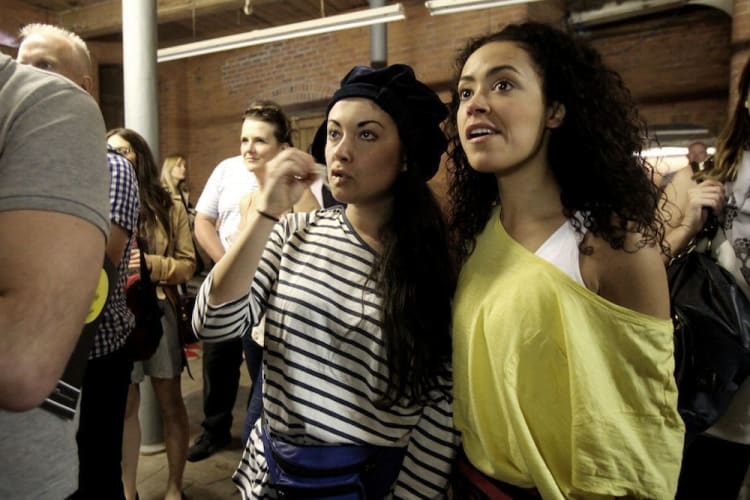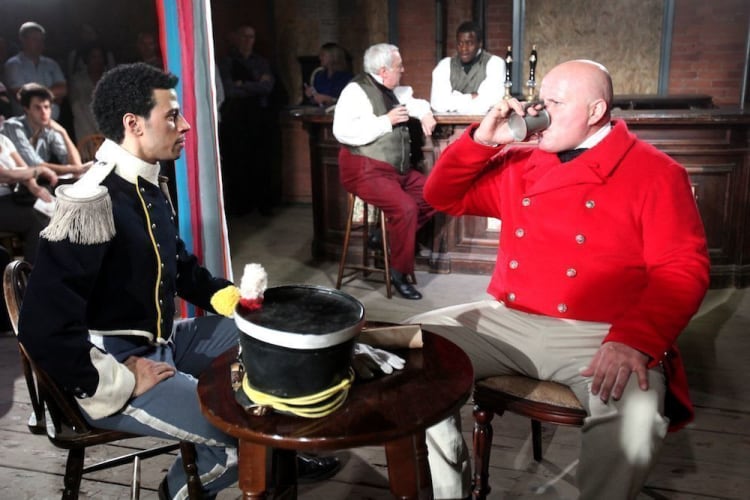We have a ticket and instructions to meet on a car park in Manchester's Northern Quarter. There, we are split up to avoid police and reporters and taken by young, enthusiastic people dressed for dancing on a roundabout route to an empty mill building, where our hands are stamped on entry.
This is the start of the latest site-specific piece from the Library Theatre, giving us an impression of the rave culture of the late 1980s, when the Thatcher government enacted laws to outlaw young people gathering to listen to music and dance and Manchester's Chief Constable James Anderton carried them out with great enthusiasm.
Parallels are drawn in Polly Wiseman's script and Paul Jepson's staging with the infamous Peterloo Massacre of 1819, when peaceful, unarmed protesters demanding universal male suffrage walked to St Peter's Fields in Manchester—"Peterloo" was the nickname for the event as it was only four years after the Battle of Waterloo, just as "gate" was added to every scandal after Watergate—from miles around to hear campaigner "Orator" Henry Hunt speak, only to be broken up violently by troops under the orders of local magistrates. The over-zealous police chief then was Joseph Nadin, whose actions also resulted in 18 deaths and more than 650 seriously injured protesters.
The play flits between scenes from the two eras as the audience is led between areas of the building, and the two come together as characters from both eras interact in scenes that could be drug-induced hallucinations or could be messages of hope from beyond the grave.
It is really an impressionistic piece; the thing with impressionism is that you have to stand back far enough to stop noticing the details before the piece makes sense as a whole. On reflection—and with a few gaps filled in from my own knowledge—there are some interesting parallels, but when you're in the thick of the action it feels like a lot of bits of information, much of it well-researched, that don't come together as a narrative or bring real substance to the characters, the situations or the politics of either era.
The rave sections are just dancing and taking drugs. The only intrusion into this is not from the police but from the Manchester gangs, who were notorious for violently intruding into raves and legal clubs to take over the drugs trade. From 1819, we see a number of episodes but don't get chance to get to know any of the characters.
The message that the furthest past appears to have for the kids of the more recent past, who are largely indifferent to the politics and just want to party, is that you have to fight for your freedom, but the examples that scroll across the screens at the end are rather superficial, such as the online petition to get Ian Duncan Smith to live for a week on benefits. While some people may feel that they are exercising their right to protest by signing e-petitions and protesting on Facebook and Twitter, these things rarely result in anything but the most minor changes.
The site-specific nature of the production is perfectly suited for the 1980s scenes, but Peterloo happened in a field, not a factory building, and other scenes are constructed within the building just as they would be on a stage. There were a few moments where I felt a reaction to being in the middle of the action, such as that evocative rumbling beat in the distance as you walk through the door of a club before walking up the smoky stairs towards the music, and a slight feeling of danger as the Peterloo troops with modern riot shields charged actors and audience together.
The cast work very hard, and there are some impressive quick costume changes between eras as the director cleverly diverts your attention. Rachel Austin stands out as particularly strong in both eras, although you have to worry for her voice as she is shouting for the audience to follow her through the streets and shouting over the music at the rave for much of the night. Leah Hackett is also very good as the young innocent studying politics who starts to listen to the message from the ghosts of the past.
Adam Fogerty is brilliantly intimidating both as the gang boss and as police chief Joseph Nadin, although surely parallel casting would mean he should be portraying James Anderton, whose forthright views could certainly have added some political context. Simeon Truby plays a couple of smaller roles, but also does a very good job as musical director and composer. Some other good performances from Stephen Fewell as "southern jessie" Henry Hunt and the DJ, plus Janey Lawson, Pete Ashmore and Dean Fagan.
Triibute has to be paid to both the technical crew and those who were ushering the audience around, who did a difficult job very well.
I'm not sure what I was meant to feel coming out of this show. I don't feel politically motivated to fight for my freedom, more knowledgeable about the history of my city or to have learned anything new about human nature. Just like a night out in a club, it was fun while it lasted, but it hasn't left me with anything that will change my life in any significant way.


